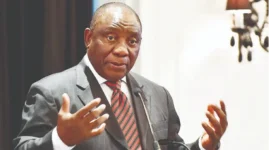US Clashes with South Africa Over Land Reform Plans.
South Africa is facing U.S. criticism over its new land reform law, and President Trump threatens to cut funding. The dispute echoes earlier conflicts over Zimbabwe's land reforms.
Trump called South Africa's land expropriation law "a massive human rights violation" on social media. He claimed the country discriminates against certain groups and demanded an investigation.
South African President Cyril Ramaphosa rejected these claims. He said the new law follows proper legal steps and the constitution. "Our country has not confiscated any land," Ramaphosa stated.
He noted South Africa receives limited U.S. aid, mainly for HIV programs. This amounts to 17 percent of the country's AIDS budget through the PEPFAR initiative.
Zimbabwe faced similar pressure when it reformed land ownership years ago. Western nations imposed sanctions, saying the program violated rights. But analysts say Zimbabwe's reforms helped most citizens and improved food security.
"African nations must control their resources without apology," said Methuseli Moyo, a political expert at Zimbabwe's National University of Science and Technology.
Other experts stressed that land reforms aim to fix past wrongs. "These changes address inequities from colonialism," said governance specialist Teddy Ncube. He urged the U.S. to let South Africa handle its domestic affairs.
ZANU PF leader Obert Mpofu backed South Africa's plans. "Land redistribution meets resistance but benefits the majority," he said.
The debate continues as more African nations look to Zimbabwe's example. South Africa plans a different approach but shares the goal of fair land distribution.
South Africa is facing U.S. criticism over its new land reform law, and President Trump threatens to cut funding. The dispute echoes earlier conflicts over Zimbabwe's land reforms.
Trump called South Africa's land expropriation law "a massive human rights violation" on social media. He claimed the country discriminates against certain groups and demanded an investigation.
South African President Cyril Ramaphosa rejected these claims. He said the new law follows proper legal steps and the constitution. "Our country has not confiscated any land," Ramaphosa stated.
He noted South Africa receives limited U.S. aid, mainly for HIV programs. This amounts to 17 percent of the country's AIDS budget through the PEPFAR initiative.
Zimbabwe faced similar pressure when it reformed land ownership years ago. Western nations imposed sanctions, saying the program violated rights. But analysts say Zimbabwe's reforms helped most citizens and improved food security.
"African nations must control their resources without apology," said Methuseli Moyo, a political expert at Zimbabwe's National University of Science and Technology.
Other experts stressed that land reforms aim to fix past wrongs. "These changes address inequities from colonialism," said governance specialist Teddy Ncube. He urged the U.S. to let South Africa handle its domestic affairs.
ZANU PF leader Obert Mpofu backed South Africa's plans. "Land redistribution meets resistance but benefits the majority," he said.
The debate continues as more African nations look to Zimbabwe's example. South Africa plans a different approach but shares the goal of fair land distribution.












